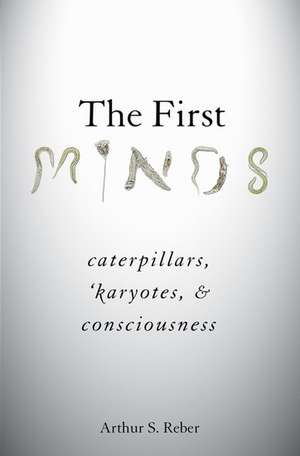The First Minds: Caterpillars, Karyotes, and Consciousness
Autor Arthur S. Reberen Limba Engleză Hardback – 17 ian 2019
Preț: 372.73 lei
Nou
Puncte Express: 559
Preț estimativ în valută:
71.32€ • 76.27$ • 59.47£
71.32€ • 76.27$ • 59.47£
Carte disponibilă
Livrare economică 27 martie-10 aprilie
Preluare comenzi: 021 569.72.76
Specificații
ISBN-13: 9780190854157
ISBN-10: 0190854154
Pagini: 296
Dimensiuni: 236 x 160 x 20 mm
Greutate: 0.57 kg
Editura: Oxford University Press
Colecția OUP USA
Locul publicării:New York, United States
ISBN-10: 0190854154
Pagini: 296
Dimensiuni: 236 x 160 x 20 mm
Greutate: 0.57 kg
Editura: Oxford University Press
Colecția OUP USA
Locul publicării:New York, United States
Recenzii
In The First Minds, Reber masterfully organizes and presents this challenging theory in book form, which introduces readers to his reasons for positing the early origin of consciousness. He begins with the question of whether robots can be conscious, contrasting weak AI with strong AI and concluding that computers will not have minds because they do not have self-awareness and agency. He then gives a historical review of the resistance to Donald Griffin's ideas of animal awareness and Brian Key's rejection of fish pain, offering a few approaches to his viewpoint. This is a well-constructed book, worth reading even for those who do not believe the premise.
Notă biografică
Arthur S. Reber earned his Ph.D. from Brown University (1967). He was in the Psychology Department of the University of British Columbia from 1966 to 1970 when he moved to Brooklyn College and the Graduate Center of the City University of New York. After retiring in 2005, he returned to UBC as a Visiting Professor. Reber is a Fellow of the Association for Psychological Science and the American Association for the Advancement of Science, and was a Fulbright Professor 1977-1978 in Innsbruck, Austria. He is also a lexicographer (Dictionary of Psychology - Penguin), a novelist (Xero to Sixty - Create Space), and an authority on poker and gambling (Poker, Life and Other Confusing Things -- Conjelco, The New Gambler's Bible -- Three Rivers, and Gambling for Dummies -- Wiley, with L. Krieger and R. Harroch).
